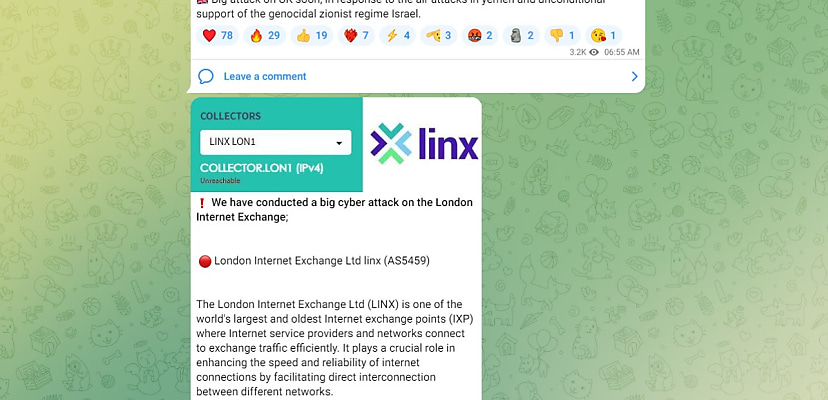Share this article on:
Powered by MOMENTUMMEDIA
Breaking news and updates daily.
Hacktivist group Anonymous Sudan says it disrupted one of the world’s largest internet exchanges. But did it really go down?

The hacktivist group Anonymous Sudan has said it has disrupted the operations of the London Internet Exchange.
The hackers – thought to be Russian-affiliated at the very least – boasted of the attack on their Telegram channel before and after the event.
“Big attack on UK soon, in response to the air attacks in Yemen and unconditional support of the genocidal zionist regime Israel,” Anonymous Sudan wrote on its Telegram page on 13 January.
Later in the day, the group posted again, claiming the attack was a success.
“We have hit the routing infrastructure of the London internet exchange point and rendered most of the BGP routing infrastructure and main IXP networks like LON1 unreachable,” the group said.
Anonymous Sudan normally shares links to sites such as Check-Host.net to prove downtime from one of its distributed denial-of-service (DDoS) attacks, but in this instance, the only “proof” provided is a small thumbnail image showing one of the London Internet Exchange’s collectors being unreachable.
What Anonymous Sudan said next in its takedown post makes the claim seem even more dubious.
“We therefore claim any damage to the overall health of the London Internet Exchange Ltd and any related services,” Anonymous Sudan said.
This makes it sound like the gang may be being more than a little opportunistic in claiming it caused a disruption – the group could be trying to claim a simple minor outage as its own handiwork.
That’s assuming any outage actually happened. The London Internet Exchange’s own traffic visualisation tool doesn’t show any outage on LON1 in the last week, for instance.
In the words of threat tracker CyberKnow on X (formerly known as Twitter), “we expected this to be too good of an opportunity for AS Sudan not to try and market themselves”.
The United States and the United Kingdom began air attacks on targets in Houthi-controlled Yemen on 12 January following a series of drone and missile attacks on international shipping in the Red Sea. Houthi forces have been carrying out these attacks in support of Hamas in its war against Israel.
Despite two rounds of air strikes, the Red Sea attacks appear to be continuing.
While Anonymous Sudan may not have done anything malicious other than spread a few fibs this time around, the group has caused disruptions in the past. It has successfully targeted ChatGPT, taken down League of Legends servers, and even made an enemy of fan fiction writers.

David Hollingworth has been writing about technology for over 20 years, and has worked for a range of print and online titles in his career. He is enjoying getting to grips with cyber security, especially when it lets him talk about Lego.
Be the first to hear the latest developments in the cyber industry.